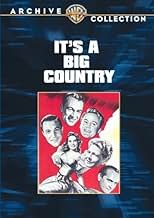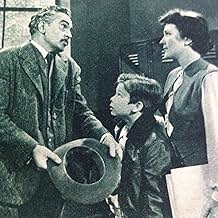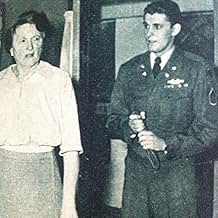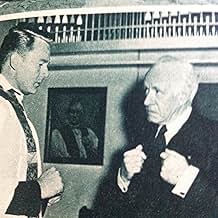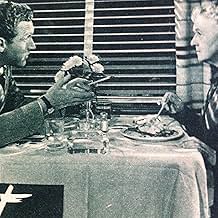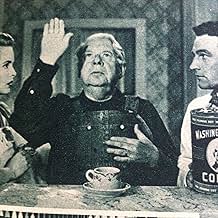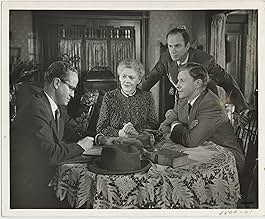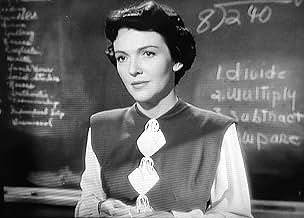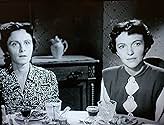Füge eine Handlung in deiner Sprache hinzuComprised of eight unrelated episodes of inconsistent quality, this anthology piece of American propaganda features some of MGM Studios' best directors, screenwriters and actors; it is narra... Alles lesenComprised of eight unrelated episodes of inconsistent quality, this anthology piece of American propaganda features some of MGM Studios' best directors, screenwriters and actors; it is narrated by Louis Calhern.Comprised of eight unrelated episodes of inconsistent quality, this anthology piece of American propaganda features some of MGM Studios' best directors, screenwriters and actors; it is narrated by Louis Calhern.
- Miss Coleman
- (as Nancy Davis)
- Joey Esposito
- (as Bobby Hyatt)
Empfohlene Bewertungen
This film feels like a moving representation of Norman Rockwell paintings, displaying a homespun, good-natured respect for traditions and the values that drove the United States to become successful. From the viewpoint of the 21st century, some of these values seem naïve. In our post-Watergate world, fewer Americans see government authority and other established authorities as innately benign. But it is simplistically easy to view this film as merely propaganda or naïve.
Most of the episodes in this collection of vignettes champion values that were and are important to embrace: Racial understanding. The American melting pot. The Constitutional freedoms. But reading some reviews of the film, it is clear that some viewers also see the film as a documentary on American exceptionalism. And it's a subtext that cannot be ignored. Various individuals have always promoted the idea that America is the greatest country that ever existed--teachers, politicians, the military, the clergy.
The thing that is exceptional and unique about the U.S. is its Constitution. Sometimes that message is lost in the nationalistic clamor.
The film has an exceptional cast (Frederic March continues to amaze), exceptional writing that stirs the heart and summons tears, and solid production values. For those of any age, it can serve as a marker designating the state of the country circa 1950. So many complex factors have affected the evolution of the U.S. from what it was to what it is now. I like being reminded of the optimism of that time, however naïve. And it can remind us of the values we need to preserve and the viewpoints we have thankfully left behind.
It's a film with several different segments, some serious some pretty funny about every day Americans in all walks of life, in all parts of the then 48 states.
The two I liked best were those that ironically starred the two men who were not MGM contract players, Gary Cooper and Fredric March. Gary Cooper plays a Texas cowboy talking about his state and disillusioning us with a tongue in cheek delivery about the way Texans and Texas are perceived by the other 47 states. Of course Cooper's humor and the whole premise behind this segment was that Texas was our largest state in land mass. That ended in 1959 when Alaska became the 49th state, still it's the highlight of It's A Big Country.
Fredric March plays an Italian American father who's opposed to his son, Bobby Hyatt, getting needed glasses even after teacher Nancy Davis tells him it's necessary. He's got some old world ideas that need a bit of adjustment. March plays the role with dignity never do you feel he's a caricature.
Another episode that is nicely done involves Gene Kelly, Greek American boy falling for Janet Leigh, Hungarian American girl. They've got a problem though, her father played by Hollywood's number one Hungarian S.Z. Sakall. In the past 20 years we've seen a whole lot of stories about ancient ethnic hatreds coming out of Eastern Europe. Sakall is carrying some old grudges against Greeks though he really isn't sure why. Point being that here in America you're supposed to leave that all behind. That segment is still very much relevant.
Could we make It's A Big Country today? Not at this time, maybe at some future point when we've reached a national consensus that despite all our problems, America's a pretty good place after all.
Directed by seven different directors and featuring an ensemble cast of both MGM contract actors and non contract players, this film portrays various stories and characters, each representing different aspects of American life as it existed in the 1950s. I won't go over every segment, but I will mention some that stood out and why.
In the segment concerning the Hungarian immigrant (S. Z. Sakall) who does not want his daughter to marry a Greek because Hungarians hate Greeks - Is that even true?
The third segment is different from the rest as it is a mini documentary concerning successful and prominent Black Americans. This is actually the best part of the film as it was very informative and progressive for its time.
The fifth segment about a Jewish soldier who has been to Korea visiting the mother of a dead comrade in arms seems like it might have originally been written concerning WWII soldiers.
The sixth segment has Gary Cooper as a Texan disputing Texas stereotypes by dispensing even more Texas stereotypes. Qualifications for this judgment - I am a Texan.
The seventh segment also seems like it might have been written for WWII. Van Johnson plays the minister in a church that the president attends when in Washington, and as a result he writes a bunch of dull wonky sermons about public policy that only the president could appreciate. The reason that I think that it was written for WWII is that Lewis Stone talks about how the president was missing if traveling or relaxing at Hyde Park, which is where Roosevelt lived. Also, at the end, when the president is going to come see Johnson's character, there is the distinct sound of crutches.
I liked the introductory segment the best because it had William Powell in it AND it had Powell, as a passenger on a train who puts an annoying know it all in his place. Powell is actually the reason I decided to watch this in the first place.
I would say the film as a whole is a tough slog unless you look at it in its historical context.
An opening segment on a train, that draws us into the whole thing, features James Whitmore as a patriotic, "I love America" type. "Which America?" asks the always-debonair and well-spoken William Powell. We then see the many sides of our country depicted through vignettes.
There are a couple of segments against prejudice. One is about a Greek-hating Hungarian American father of several girls (S. Z. Sakall) whose eldest daughter (Janet Leigh) falls for a young Greek American (Gene Kelly - actually pushing 40 at the time but you'd never guess it). As a piece against xenophobia, it's nice, and gets its point across with humor, wit, and romance.
There's also a segment against religious prejudice, where an ex-seviceman named Maxie Klein (Keefe Brasselle) visits the mother (Marjorie Main) of a dead war buddy. At first the mother doesn't know the man because her son had used his nickname in his letters. She's suspicious of his motives because he's Jewish. Eventually she's grateful for the comfort the stranger has given her, putting aside whatever prejudices she was harboring, and requesting his mother's address so that she can write her about it all.
The segments are all fairly interesting, but not exactly first-rate drama or comedy.
There's one about a minister (Van Johnson) who learns a lesson in humility from a deacon (played by Louis Stone). There's one in which Fredric March plays a working-class Italian American who won't be convinced by a schoolteacher (Nancy Davis) his son needs glasses. Gary Cooper plays a cowboy in a humorous monologue about Texas. Louis Calhern narrates a documentary sequence about African Americans. Ethel Barrymore and George Murphy star in a dramatic sketch wherein an old Boston-Irish woman is upset because the US Census ignored her. Etc.
The overall effect is a little like picking up an old copy of Reader's Digest.
Without the stars, this would be very minor, indeed. With them, it becomes a big film. Not a great film, but, undoubtedly, a big one. It covers a lot of ground, and comes up a little bit short.
Wusstest du schon
- WissenswertesWhen she discovers that Icarus Xenophon (Gene Kelly) is Greek, Janet Leigh does a spot-on imitation of S.Z. "Cuddles" Sakall's (S.Z. Sakall) trademark response to upsetting news, placing her palms against her cheeks and emitting an exasperated "Sheeeesh!"
- PatzerWhen the census taker asks Ethel Barrymore her name, she replies "Mrs. Brian Patrick Riordan" and he writes it down. Always with censuses, a woman's given name is entered.
- Zitate
Rosa Szabo Xenophon: Marry me? You don't know anything about me.
Icarus Xenophon: You're a girl. You're pretty and you're modest. What else is there to know?
- VerbindungenEdited into A Letter from a Soldier (1951)
Top-Auswahl
- How long is It's a Big Country: An American Anthology?Powered by Alexa
Details
- Erscheinungsdatum
- Herkunftsland
- Sprachen
- Auch bekannt als
- Nueve vidas
- Drehorte
- 1772 Church Street NW, Washington, District of Columbia, USA(St. Thomas Episcopal Church - where Rev. Birch was assigned)
- Produktionsfirma
- Weitere beteiligte Unternehmen bei IMDbPro anzeigen
Box Office
- Budget
- 1.013.000 $ (geschätzt)
- Laufzeit1 Stunde 29 Minuten
- Farbe
- Seitenverhältnis
- 1.37 : 1

